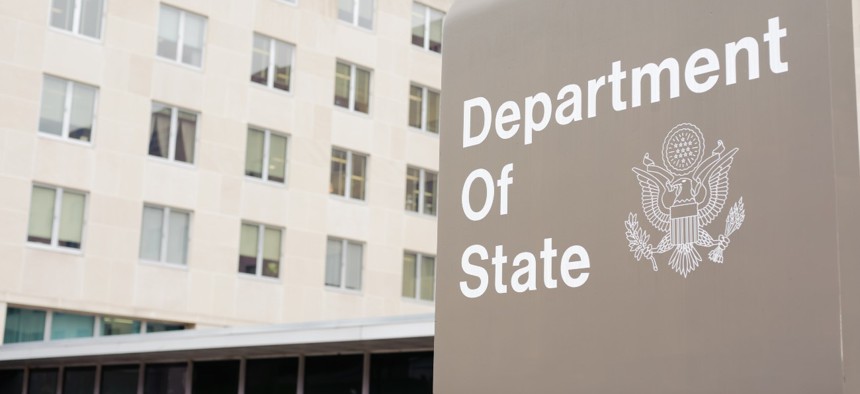
By Sorbis / Shutterstock.com
Black Ambassadors Association Calls for Diversity Reforms at State and USAID
Recommendations address recruitment, assignments, mentoring, promotions and retention.
As the Biden administration prepares to take over, the Association of Black Ambassadors recently offered recommendations on how to improve diversity and inclusivity at the State Department and U.S. Agency for International Development.
The group’s post––published in the January/February 2021 edition of The Foreign Service Journal, a publication of the American Foreign Service Association––covers recruitment, assignments, mentoring, promotions and retention. Both State and USAID have made mixed progress in improving racial and gender representation in their workforces over the years, as the Government Accountability Office found.
“The foreign affairs agencies have a collective responsibility to stand up and take serious action to address structural barriers to diversity and inclusion in their respective agencies,” said the Association of Black Ambassadors. “All employees should be provided with the skills, resources and mentoring that contribute to professional advancement. These proposed changes should be codified in the Foreign Service Act of 1980 and implementing regulations.”
Some of the recommendations for both agencies included:
- Establish ways to reward senior personnel financially for achieving diversity goals;
- Appoint a Senate-confirmed chief diversity officer to work with the agencies’ affinity groups;
- Increase the number of paid internships for individuals in underrepresented and financially disadvantaged communities;
- Don’t assign African Americans “predominantly” to the Africa Bureau and “end similar de facto practices with LatinX and Asian Americans;”
- Develop a “robust” mentoring program for all GS-levels;
- Require language in employee evaluation reports to reiterate commitments to diversity; and,
- Increase payments to decrease or eliminate student loans to potentially retain more diverse employees.
“The incoming administration faces an enormous challenge in its efforts to improve diversity and inclusion in our foreign affairs agencies,” Charles Ray, a retired foreign service officer who served two times as an ambassador, told Government Executive on Wednesday. “Having lived through the trauma of the 70s as the US military had to rebuild a sense of cohesion and professionalism after the divisive Vietnam War, I know from first-hand experience that this is a task that will not be accomplished overnight.”
He said changes could take decades, but added:
“That said, there are things that can be done right away to improve the situation, such as appointing chief diversity officers with authority to take the appropriate actions in areas such as consideration for high-level positions, promotions, and the like. I encourage the foreign affairs leadership in the new administration to take this and other actions that have been put forward by a number of retired senior foreign affairs professionals at the earliest opportunity.”
The nonprofit Partnership for Public Service published a related report on Tuesday with recommendations on reforming personnel and management practices at the State Department, which had a 16-month hiring freeze under the Trump administration that severely impacted operations and morale.
The Partnership also said that improving diversity and inclusivity is a long-term and multifaceted initiative. “The department has to overcome its longstanding reputation for having a dominant culture of white men hailing from elite educational institutions,” said the report. “And it needs to ensure that all staff who identify with an underrepresented community don’t experience exclusion, discrimination or other inequities, which can be detrimental to work performance, career advancement and mission success—as well as to the department’s standing in the global community.”
President Trump issued an executive order in September that banned diversity training “rooted in the pernicious and false belief that America is an irredeemably racist and sexist country” for federal employees, contractors, grantees and the military, which has been met with much backlash. Last month, a federal judge in California issued a preliminary injunction for the directive as it applies to contractors and grantees.
President-elect Biden nominated Antony Blinken, who served as deputy Secretary of State during the Obama administration, to be Secretary of State and Amb. Samantha Power, who was the permanent representative to the United Nations under Obama, to be USAID administrator. He has committed to making diversity a key tenet of his administration, but his team still is getting reminders to do so.
Reps. Veronica Escobar, D-Texas, and Joaquin Castro, D-Texas, sent a letter to Blinken over the weekend about the “grave disparities in racial and ethnic minority representation in the Foreign Service” and “declining representation of women and minorities in the civil service and lower rates of advancement by women and minority civil servants.”
Diversity should be one of the agency’s “highest priorities” and not just pursued through “staffing quotas,” they wrote. “As we continue to combat a global pandemic, a warming climate, and wavering global trust in the promise of democracy, we cannot afford to do anything other than engage the full breadth of American ingenuity and intellect.”







